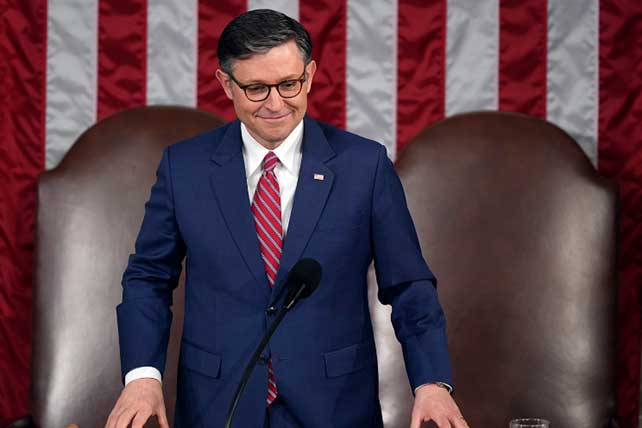WASHINGTON (RNS) — On officially accepting his post, newly reelected House Speaker Mike Johnson recited a prayer he attributed to Thomas Jefferson, saying the third president prayed it every day.
Johnson had hardly finished his speech when the debunking began.
Journalists and others quickly noted that the website of Monticello — Jefferson’s historic home in Virginia, currently operating underneath the Thomas Jefferson Foundation — had a dedicated page declaring that the “National Prayer of Peace” is not, according to researchers, something Jefferson is known to have ever recited publicly or privately.
RELATED: House Speaker Mike Johnson’s Use of Anti-Porn Accountability App Riles Media
“We have no evidence that this prayer was written or delivered by Thomas Jefferson,” the website reads. “It appears in the 1928 United States Book of Common Prayer, and was first suggested for inclusion in a report published in 1919.” The site classifies the attribution among “spurious quotations” linked to Jefferson.
How the prayer became associated with Jefferson, a deist who famously edited Gospel accounts of miracles out of his own Bible with a blade, turns out to be a yarn unto itself.
Democratic Rep. Jared Huffman of California, a co-founder of the Congressional Freethought Caucus — a group dedicated to, among other things, the separation of church and state — published a post on X shortly after Johnson’s speech accusing the speaker of “mak(ing) stuff up.”
“The prayer that you read in the House Chamber today was not written by Thomas Jefferson and your claim that he recited it ‘every day’ is false,” Huffman wrote.
In a separate interview with RNS on Tuesday (Jan. 7), Huffman said other members of Congress have privately voiced frustration to him about the misattribution of the prayer, and at least one personally thanked him for speaking out.
“It created a stir,” Huffman said, referring to the prayer.
Johnson, who said he had offered the prayer earlier in the day at a bipartisan interfaith service, referred to the bulletin of the gathering when making the claim that Jefferson read the prayer every day. “I offered one that is quite familiar to historians and probably many of us,” Johnson said during his speech.
His office did not respond to multiple requests for comment on this story.
Seth Cotlar, a professor of American history at Willamette University, writing on the social media website Bluesky, related what he called the “wild” history of the prayer, which has been repeatedly misattributed to Jefferson, including in one instance by a person who would at one point serve as head of the Jefferson Foundation — the same group that ultimately debunked the attribution. But by the mid-20th century, the misattribution was common in some conservative circles and, Cotlar said, published as Jefferson’s in white nationalist publications.
“Political memes always have lives that work like a long game of historical telephone,” Cotlar wrote.
Speaking to RNS, Huffman said the prayer was an example of false quotes “curated by Christian nationalists, one of many intended to rewrite history and support their political agenda of institutionalizing Christianity as the official religion and the dominant political force of the United States.”
The prayer, he said, is part of “a series of relentless attacks on church-state separation and, quite honestly, truth.”

